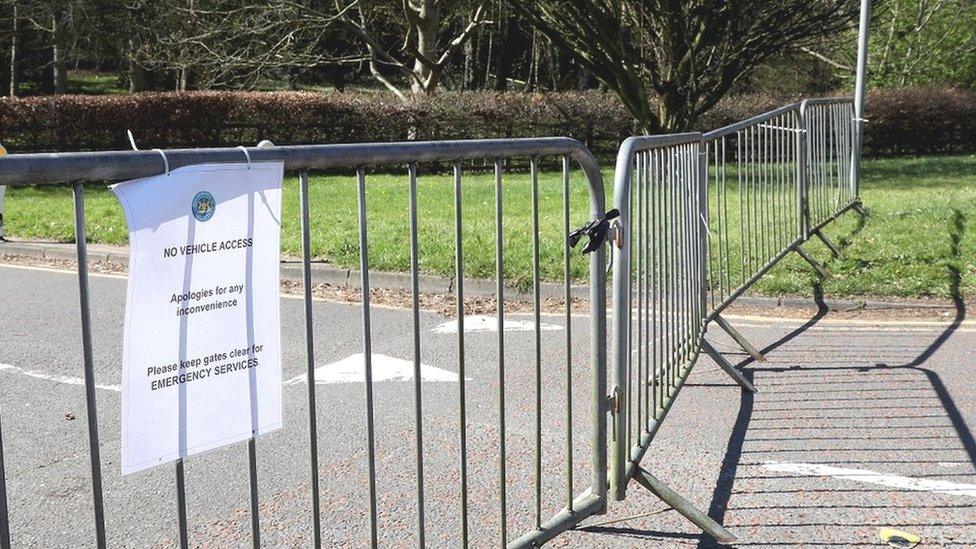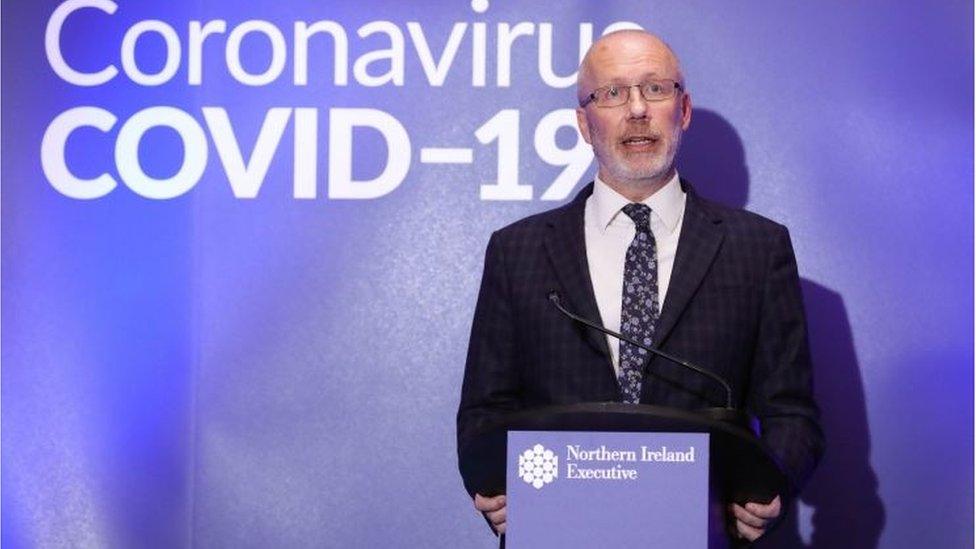Coronavirus lockdown: United front but tensions on the back benches
- Published

If the past few days is anything to go by, the Stormont Executive is easing us out of the lockdown with more aplomb than they managed when imposing the Covid restrictions.
The Stormont recovery strategy might have frustrated many by not including timelines.
But it left ministers with sufficient wriggle room to manage any internal differences over which regulations to drop and which to maintain.
This week, Arlene Foster and Michelle O'Neill presented a united front at their joint appearances, with the DUP leader quipping to a Stormont Committee that "Michelle and I are now basically in the same household".
However, alongside this display of high-level ministerial harmony, there was evidence in the assembly chamber of continuing tensions between their respective parties' backbenchers.
The DUP's Christopher Stalford described the lockdown as "house arrest" and warned that a free people will not consent to live under such restrictions forever.
By contrast, Sinn Féin's Martina Anderson told Mr Stalford he didn't have his finger on the pulse and her constituents were expressing concern the regulations might be eased too soon.
Sinn Féin backbenchers reiterated their criticisms of the Health department's handling of care homes and testing.
In response, Health Minister Robin Swann's Ulster Unionist colleague Alan Chambers complained that the "hurlers on the ditch" had been out in force and wondered what this meant for "collective responsibility".
During our uncertain journey between Step one and Step five of the recovery plan there will be plenty of opportunity for these underlying tensions to surface.
One former Stormont insider joked to me that the sequence for announcements in the future will be: Step one, executive meets and agrees next stage, Step two, Minister Poots goes on solo run, Steps three and four, repeat Steps one and two.

Professor Ian Young has warned of the threat of a second wave of the pandemic in the autumn
Of course this isn't just a political wrangle, but a path which has to be navigated with the scientific and medical facts to the forefront.
This week, Stormont's Chief Scientific Adviser, Professor Ian Young, warned the threat of a second wave of the pandemic in the autumn remains a "high likelihood".
Professor Young wrote in the Irish News, external that it will take three weeks for our scientists to work out exactly what impact any particular lifting of the regulations has on the virus's R or reproductive number.
Three weeks is a very long time in politics, and ministers may well feel tempted to reward the public by approving a series of piecemeal changes.
But will that make it more difficult for their own advisers to properly assess the extent to which particular relaxations are impacting on the suppression of the pandemic?
So it's a balancing act, which will require us all to demonstrate patience and perseverance, as we hope the recent downward trajectory in our Covid case and fatality figures continues.
Questions please
On Monday, I am handing over the reins of the Inside Politics Q&A to my colleague Stephen Walker who will be presenting the podcast covering his home constituency of North Down.
Stephen will be joined by the Green Party MLA Rachel Woods, the UUP's Alan Chambers, the DUP's Gordon Dunne and the Alliance's Andrew Muir.
Apart from being available on BBC Sounds and in vision on the BBC News NI website, Inside Politics Q&A will also return to Radio Ulster with a very early play out at 06:30 BST on Tuesday.
If you have any questions you want Stephen to put to the panel please send them via email on Inside.Politics@bbc.co.uk or via twitter using our hashtag #bbcip.
